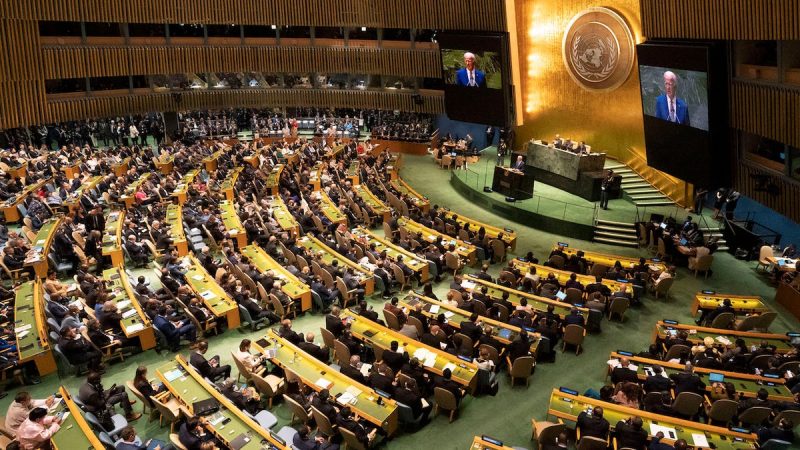
Most global leaders at UN General Assembly find common trend in condemning Russian invasion of Ukraine
Through nearly three days of speeches by world leaders at this year’s United Nations General Assembly, many issues have been addressed, but aside from climate change, one pressing matter seems to have been universally condemned: Russia’s war in Ukraine.
As more than 80 world leaders have spoken to the assembly through Thursday afternoon at U.N. headquarters in New York City, many have remarked negatively on Moscow’s stalled military operations in neighboring Ukraine. They have either called out Russia by name, referred to unspecified world conflicts, or spoken about the inability of the U.N. to confront Moscow or its leaders.
In his Wednesday speech, Lithuanian President Gitanas Nausėda said Russia had brought back ‘an old-style colonial war’ to Europe.
Slovak President Zuzana Čaputová accused Russian forces of committing war crimes. ‘For more than 570 days, Russia’s forces have been killing innocent Ukrainian civilians, kidnapping children, and destroying towns and cities,’ she said.
Finnish President Sauli Niinisto said Moscow’s ‘aggression is a direct violation of the United Nations Charter, to which we are all committed by aiding Ukraine.’
‘It exacerbated all these crises of various kinds and destroyed not only thousands of human lives but also the optimism that we are able to build back better,’ said Bulgarian President Rumen Radevn.
Latvian President Edgars Rinkevics was even more blunt. ‘Russia must bear full legal and financial responsibility for its aggression,’ he said. ‘We must ensure complete accountability for all crimes committed in Ukraine. It means the responsibility of Russia as a state for violations of international law.’
On Tuesday, President Biden asked: ‘If we allow Ukraine to be carved up, is the independence of any nation secure?’
Leaders from Poland, Portugal, Hungry, Uruguay, the Czech Republic and many others also weighed in on the war. Many said the conflict has strained regional stability and impacted diplomatic relations between nations.
Russia has been almost universally condemned for its February 2022 invasion. Since the fighting began, thousands are estimated to have been killed on both sides.
On Wednesday, Ukrainian President Volodymyr Zelenskyy was in New York to address the U.N. Security Council, where he advocated for international assistance in helping his country fend off Russian forces. He also spoke at the General Assembly.
He accused Russia of weaponizing food, energy to abducted children in its war against his country.
‘When hatred is weaponized against one nation, it never stops there,’ he said. ‘The goal of the present war against Ukraine is to turn our land, our people, our lives, our resources into weapons against you — against the international rules-based order.’
On Wednesday, Albanian Prime Minister Edi Rama called out Russia over attempts to prevent Zelenskyy from speaking at the U.N. Security Council. He noted that the notice of speaking orders was given in advance and any objections should have been raised beforehand.
‘I want to assure our Russian colleagues and everyone here that this is not a special operation by the Albanian presidency,’ Rama said, referring to Moscow’s wording of its invasion in Ukraine.
In response, Vassily Nebenzia, the Russian ambassador to the U.N., said Albania had placed its ‘political and ideological beliefs above the obligations’ of the council.
‘I must say that coming from all these lectures of violating the rules in this building is quite an impressive show,’ Rama replied. ‘But as far as you repeat it many times that the violation here is about President Zelenskyy speaking before the council members, there is a solution for this. If you agree, you stop the war and President Zelenskyy will not take the floor.’
Russia is slated to take the podium at the General Assembly on Saturday.
‘Ukraine exercises its right to self-defense,’ Zelenskyy said. ‘Helping Ukraine with weapons in this exercise, by imposing sanctions and exerting comprehensive pressure on the aggressor, as well as voting for relevant resolutions, would mean helping to defend the U.N. Charter.’
The U.S. has issued billions of dollars in military assistance to Ukraine, which has put up a tougher resistance than many expected. Russia’s forces have been described as demoralized as reports of faulty equipment and a lack of necessities have plagued its ability to conquer its neighbor.
Fox News Digital’s Bradford Betz contributed to this report.
